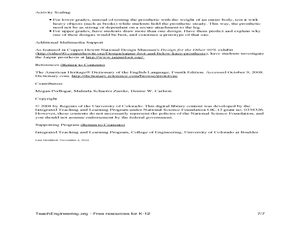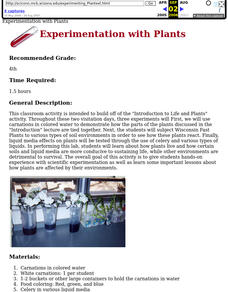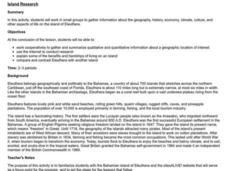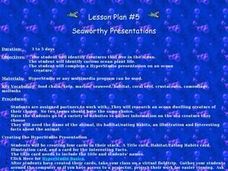Curated OER
Discovering Seeds
Young scholars compare seeds with seedlings. In this life science lesson, students make observations of seedlings and the seeds they grew from, paying special attention to the roots. Lesson includes extension activities.
Curated OER
Habitat Breakdown
Students investigate the fragility of insects and organisms and their survival needs. In this habitat instructional activity, students discuss what elements they need to survive day to day, then hypothesize what they would need to...
Curated OER
Saved by a Shark
Students explore the marine ecosystem and the importance of sharks. In this shark instructional activity, students look at photos of the Flower Garden Banks National Marine Sanctuary and discuss the animals that live there. They discuss...
Curated OER
Water Wonders
Students explore hydrology concepts. In this environment and biology lesson, students identify and describe macroinvertebrates using a variety of pictures and resources. Students observe and write about a classroom aquarium in which...
Curated OER
Global Warming
First graders discover the effects of global warming on polar bears. In this life science lesson, 1st graders model the polar bear's habitat and observe what happens as they raise the temperature. They record their observation in the...
Curated OER
The MPA “GamePlan”
Eighth graders explore the purpose of having Marine Protected Areas. For this environmental science lesson, 8th graders simulate the planning process by playing a board game. They explain the positive and negative effects of trade offs.
Curated OER
Jane Goodall, Renowned Naturalist and Champion of Chimpanzees
Students study the life of Jane Goodall and how she made an impact studying chimpanzees. In this endangered species instructional activity students write in their journals.
Curated OER
Introduction to Ocean Grazers
Students explore biology by creating a poster with classmates. In this oceanography instructional activity, students identify the importance of coral reefs to the ocean's ecology and examine a food web of ocean animals. Students define a...
Curated OER
Habitats and Adaptations
Students research and describe the habitat and adaptations of a reef animal. After the student is assigned a habitat, they design and draw a cresture adapted to eat each food and to live in each habitat.
Curated OER
Where are the Dinosaurs?
Students construct their own diorama based on the life of a dinosaur. In this dinosaur lesson, students create models of dinosaurs and dinosaurs' eggs to explore the life cycle of this extinct species.
Curated OER
The Rainforest
Students learn the characteristics of the rainforest. In this rainforest lesson, students read stories about the rainforest and discuss them. Students work in groups to brainstorm all the facts they know about the rainforest...
Curated OER
Flight of the Future/Space Flight
Students explore space science by viewing videos on YouTube. For this moon landing lesson, students view clips of Neil Armstrong taking his first step on the moon and discuss the space race between the U.S. and Russia. Students utilize...
Curated OER
Reptiles and Amphibians
Fourth graders explore biology by viewing animal videos in class. In this amphibian and reptile lesson plan, 4th graders identify the key differences between reptiles, amphibians and other animal classifications. Students view video...
Curated OER
Prosthetic Party
Students examine human anatomy by creating a prosthetic limb. In this medical engineering instructional activity, students view numerous images of prosthetics used in science today and define several medical terms associated with...
Curated OER
Experimentation With Plants
Fourth graders experiment with different varieties of plants and draw conclusions after performing a series of lab activities. A very helpful student worksheet is given. This is a nicely done introductory lesson for life science.
Curated OER
Sea No Evil
Students research the characteristics of marine life at different ocean depths. They use their findings as the basis for a classroom 'Life Under the Sea' museum exhibit.
Curated OER
Island Research
Students will work in small groups to gather information about the geography, history, economy, climate, culture, and other aspects of life on the island of Eleuthera. Lesson contains adaptations for all levels.
Curated OER
The Making of a Star
Students create schematic diagrams of the new Russian space station module. They compose an imaginary yet realistic series of diary entries from the point of view of an astronaut living on board the completed space station.
Curated OER
Wild Arctic
Students explore key terms, including food web and food chain. They discuss Arctic plants and animals, devise at least three Arctic food chains and create a food web showing connections among Arctic life.
Curated OER
People Change the Landscape
Students examine ways in which humans have brought change to the natural environment. In this ecology and literacy lesson, students listen to the book Island Boy by Barbara Cooney. Students observe and define map-reading vocabulary as...
Curated OER
The Water Nearby
Learners explore water located near where they live. In this map skills maritime lesson, students use Google Maps to find their school and the body of water closest to them. Learners research the body of water and answer questions about it.
Curated OER
Forest Succession
Young scholars research environmental change and why forests cannot stay the same for long. For this environmental growth lesson, students discuss the life cycle of a tree and examine tree cookies to discover the age of these...
Curated OER
Native Lands: Indians in Georgia
Students investigate the Native Americans of the Muscogee Creek and their use of the land. In this U.S. history lesson, students investigate the importance of the deer for the Muscogee Creek peoples' way of life and the many uses they...
Curated OER
Seaworthy Presentations
First graders research ocean animals and plants on the web. In this ocean habitat lesson, 1st graders prepare a multimedia presentation. Students will work on their presentations in pairs and every group should have its own...























